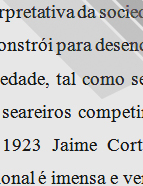

................................
The overseas expansion would see the growth of the slave trade, the products of the islands (sugar from Madeira), and African goods, especially gold, which allowed the monarch to spend his ample income. After Gama’s voyage and the establishment of the Cape Route, pepper and Eastern riches would be brought to Lisbon, benefiting other societies, as Portugal had no manufactured goods to trade for imported goods. It was also necessary to consider that the State was always at the cent re of what occurred in the evolution of the nation's history: everything depended on it. "This statism, or the custom of relying on the State to manage our lives, turning it into a father figure and provider for all of us; this academicism, or education through word and book, cultivating memory and verbosity, rather than initiative, method, perseverance, and mastery of ourselves and our working tools; this bureaucratism, or universal thirst for public employment and the corresponding inability to earn an independent living, which reduces political parties to gangs of budget raiders: these three national vices are three features of the same vice — state communism — developed through centuries of corrupt economic education. The educator in our country must begin by analy s ing them ." This view of society is indispensable, for as the State is not the same as the Nation, "no reform will be effective without reforming the public spirit, healthily guided ." (Sérgio, O problema [The problem], p p. 30). This is why the men of Seara Nova place d such emphasis on educational reform. Education should not be limited to instruction but should include civic education, which they never tire d of advocating. (Sérgio, Education). The elite they sought to promote — and, if possible, recreate — had to be the opposite of the dominant group thus far. An elite that would be independent of the State.
